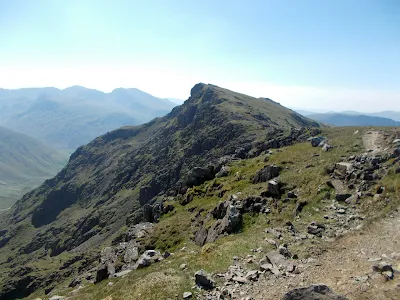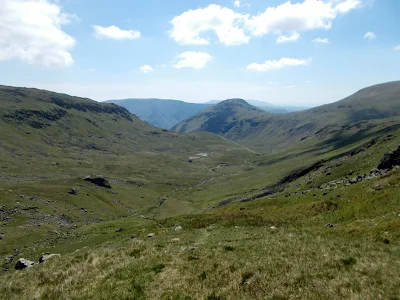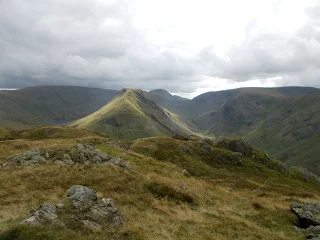There was no way I was getting across this river without getting wet. The path ahead clearly led beneath the fast flowing current to a point where it was hard to judge the depth. Further investigation up and down stream brought me to the same conclusion that this was the intended ford and that the recent heavy rain had raised the water level to such a degree that any stepping stones were well submerged. Faced with this prospect near the end of a walk where the alternative was to retrace one’s steps, it would have been into the water with walking poles at the ready to aid balance but lacking any desire to do the walk soaked through on a not so warm November morning, I admitted defeat and returned to the main path to look at my alternatives.
My map showed the path leading southwards up the Mosedale valley from Loweswater following the course of Mosedale Beck which was the name of the river. The most important feature I noticed on the map though was a footbridge a little under two miles from my present position. My map was a recent one which gave me high confidence that the bridge would still be there so I set off to find it.
The path was good if a little wet, and led up a wide and wild looking valley between windswept grassy hills. It does eventually join the Floutern Tarn path, another notoriously damp route that links Buttermere with the Ennerdale valley, but I would be leaving it at that point. With a sense of relief I reached the bridge and it took me over the stream which was less formidable than lower down and I followed the path on and slowly around to the right with the crags of Great Borne walling the valley ahead and to my left. My way led up the grassy slopes to my right and I presently followed a faint path that climbed, steeply at first and then more gradually until the uphill ran out and I stood on the modest grassy summit of Hen Comb.
Surrounded by views of this relatively remote area of Lakeland under grey November skies, I found a lunch spot sheltered from the wind and removed my copy of Wainwright’s Western fells from my rucksack along with a pen and placed a tick in the single remaining gap in the list of fells at its start. That was the 214th tick I had made in the seven volumes meaning that I had finished my quest to complete the Wainwrights.
It had been a journey that had taken me to all the regions of the Lake District, both to popular summits as well as the less frequented and one that had begun many years earlier, though it had only been during the last couple of years that I had decided to summit them all. Why the lowly Hen Comb as the last one? well – there had never been a plan but the Loweswater area along with a couple of unfinished Buttermere fells required an overnight stay owing to their distance from home and had simply been left until last for that reason.
Did I feel a sense of achievement? Certainly, though despite subsequent admiring comments from other hikers on the same quest, the completion of any ambition is one of personal satisfaction and only of passing interest to others, unless of course it is a “first” and there are precious few of those left! I returned the book to my rucksack and finishing my spicy bean burger wrap, shouldered my bag, said a prayer to the Lord for getting me this far and set off back the way I had come, careful to remember that the shorter way down the wide grassy ridge to the north would lead me to the awkward river crossing from earlier. Where from here? Well firstly it would back to Buttermere youth hostel where I was staying for a well earned pint and then… well wherever the trail takes me I’ll record it in these pages.
The route as described to Hen Comb from Loweswater Village and back covers a distance of about 7.5 miles or 12km with 1300 feet or 400m of ascent. The usual way when Mosedale Beck is fordable is just 5 miles (8km) and heads south up the ridge to the top. Parking can be found at Scalehill bridge a short distance east of the village or at Maggie’s Bridge to the west.

















































